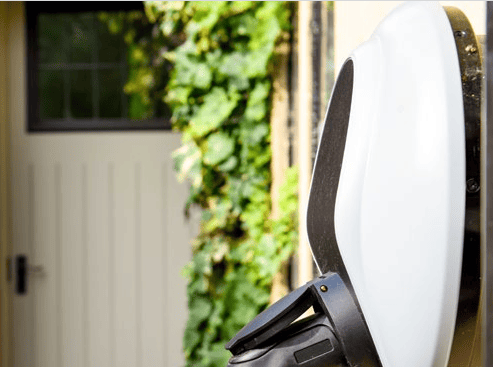Electric Vehicle Charging: What Homebuyers Really Want to Know.

As electric vehicles increasingly populate our roads and the necessity for accessible charging grows, enquiries about electric vehicle charging and EV chargepoints when buying a home will become more frequent. This article aims to tackle important questions that may emerge and allow agents to provide helpful responses.
Will the electrical system in the house support electric vehicle charging?
- Most new homes have a 100A connection as standard, which equates to around 23kW of power. As a result, the use of a 7kW chargepoint can usually be accommodated within this. It is possible that second-hand homes have a lower rated connection, and in this case the advice of an electrician should be sought to explore if electric vehicle charging is supported.
Will the chargepoint work with my car?
- Most electric vehicles in the UK use a 7-pin “Type 2” (or “Type 2 Mennekes”) connector in order to charge. Provided a car uses the Type 2 connector, the most common home chargepoints will be able to charge an electric car.
How quickly will it charge my car?
- The power delivery of the chargepoint that has been required by Building Regulations from late 2022 is 7kW, although older chargepoints could be lower power. The speed at which a car will be charged is dependent on how large the car battery is. For example, if you have a car with a battery size of 40 kWh, it will take just over 5½ hours to charge from empty to full with a 7kW chargepoint.
Are there any smart features with this chargepoint?
- The latest Building Regulations ensure that all new chargepoints must have “smart” capabilities with the ability to control electric vehicle charging from an app on a person’s phone. The enquirer or agent should refer to the manufacturer’s instructions which will explain which app they need to use. Older chargepoints might not be smart and will therefore only be controllable from within the car or on the chargepoint itself.
Can I charge my car during off peak hours?
- With smart capabilities, it is possible to schedule charging to maximise “time-of-use” tariffs which can save money on electricity bill.
How much will it cost me to charge my car?
- This will be down to the owner’s electricity provider. Some suppliers such as Octopus Energy offer specific rates to electric car owners with cheaper rates during periods of lower grid demand, such as the early hours of the morning.
Can other people use my chargepoint?
- Yes, provided they have cars which use a Type 2 connector they will be able to charge using the existing vehicle chargepoint, allowing family and friends to charge whilst visiting. It is also possible to purchase locks for electric vehicle chargepoints to ensure nobody uses the chargepoint without the owner’s permission.
What if my chargepoint stops working, who do I contact and how long is the warranty?
- In the first instance, the homeowners will need to contact the manufacturer of the chargepoint. The warranty for some chargepoints is three years; however, the home information pack should contain all warranty details.
Does my chargepoint work with solar panels?
- Please refer to the specific manufacturer in question. Many chargepoints such as Zappi will have specific solar panel integration. In these cases, the actual power from the chargepoint may vary dependent on the amount of on-site generation. This can mean it is slightly slower than 7kW, however it will be free.
I have a physical disability – will I be able to use the chargepoint?
- All new chargepoint installations must comply with Part M of the Building Regulations and the Equality Act 2010, ensuring that everyone can use them and electrical vehicle charging is accessible to all.
Do I need my own cable to charge my electric vehicle?
- Some chargepoints are “tethered”, which means the cable used to charge the car will not detach from the chargepoint. In this instance, vehicle owners will not need to have their own cable. If a chargepoint is “untethered”, the vehicle owner will require a cable which is usually provided with the car on purchase for the purpose of electric vehicle charging.
This article was written by Sam Lott, Energy Data Consultant at Sava, and originally published by Estate Agent Today.
Find out how we’re supporting housing providers with their zero-carbon planning here.
Discover how we’re training the next generation of residential surveyors through our industry recognised diplomas here.